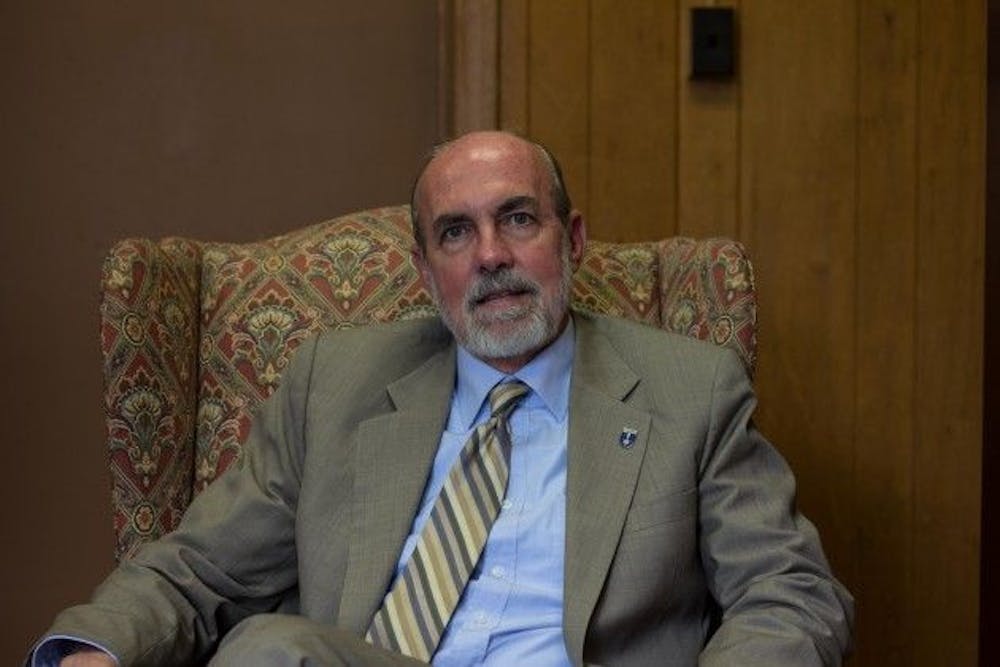Thomas Nenon, who has served on the University of Memphis faculty for over 29 years as a professor and administrator, has recently been announced as Dean of the College of Arts and Sciences-one of the University's largest colleges.
"This college probably produces nearly half the credit hours for the entire University," Nenon said. "Every undergraduate student regardless of major begins the University as a freshman and takes courses from this college, so the impact is huge. We make up about 40 percent of the faculty and half of the externally funded research. It's a very large college and the job is challenging, but that's why it's also such a great opportunity."
Although the new dean has been a philosophy professor for the past three decades at the U of M, he has also served as an interim provost, as well as numerous other administrative positions since 1992 when he got his first part-time administration position.
In 1997, the professor was offered the position to become the assistant vice provost, however, Nenon said that was never his initial plan.
"It was more of an accident," Nenon said. "I never really thought about being in administration. At some point somebody approached me and asked me if I'd want to do it. Although it's been years, I continue to think of myself as a faculty member on loan. The loan has just gone on longer than I ever expected."
In July of 2013, Nenon was asked to become the interim Dean of the College of Arts and Sciences, which he took while still teaching several philosophy classes. He noted that he thinks that earning the official title gives him a lot more integrity within the position since he will be able to finish what he plans to do.
"Obviously if you have a job in a regular position it's easier to do said job," he said. "If I make a commitment then people will be there to see me honor it. I'm glad I got the position officially, it will allow me to be more effective in leading these departments."
The College of Arts and Sciences is one of the largest colleges on campus made up of three departments-humanities, natural sciences and social sciences. However, these three categories make up many of the campus' largest classes including English, foreign languages, history and psychology.
"The hard thing is that you always have more opportunities than you do the finances to support them," Nenon said. "I try to help the departments set priorities and help them understand how they can align themselves to get whatever the resources are that they need."
Nenon said that he plans to continue on the path his predecessors have paved for him by continuing the tradition of excellence that is the University of Memphis mission statement and by continually trying to better our community.
"I think we have a pretty solid foundation for all of higher education, not just the University of Memphis or the College of Arts and Sciences," he said. "One main challenge is how we can continue to serve our mission and get better when we can't expect to have any more money."
The professor turned administrator also said that the best motivation within his position is the ability to serve. As the dean, he hopes to raise retention and graduation rates within the University. He noted since his specific college makes up such a large percentage of the course catalog, any accomplishments the college makes would have a huge impact on these statistics.
"As the faculty within the College of Arts and Sciences, we can really change the needle on student retention, learning and graduation rates," Nenon said. "We can really have a huge impact through our research. We can really change the community."
Nenon, who is originally from Memphis, enrolled in classes during the fall of 1969, however, he said he decided to take an offer from a school in Denver the next semester, since at the time he had never been farther than Little Rock, Ark., or Nashville, Tenn.
"One thing I really like about this campus is the diversity amongst the students," Nenon said. "I really believe in the mission of a public university, providing opportunity and access. So when I'm teaching, I really feel that it's great that I'm not only teaching students with a 30-plus ACT or the only ones who can afford a fancy private school or the ones whose family can afford them to never have to work. I really believe in the mission of serving the community and providing opportunities to everyone. That's why I like being here and finding ways to do that better. It makes it fun to come to work."




